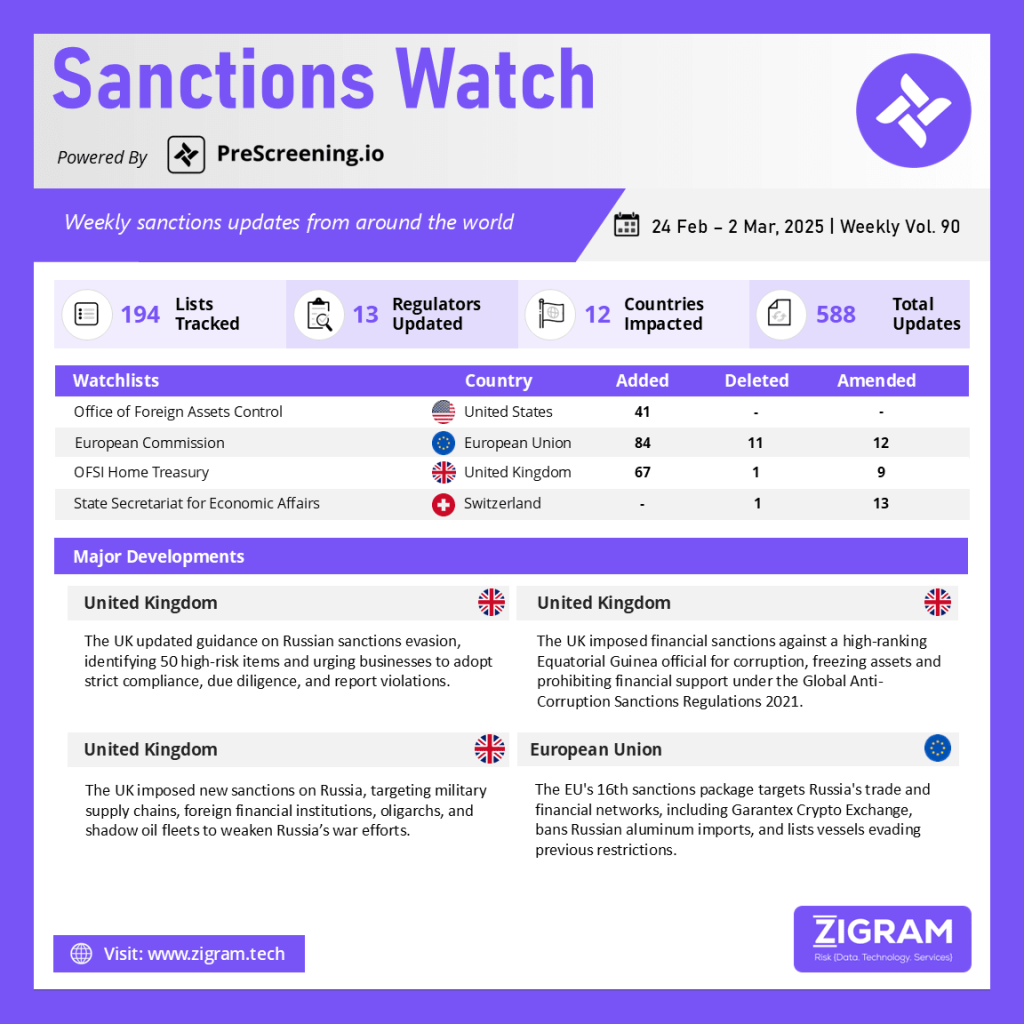Sanctions Watch Vol 90
In the latest edition of our Sanctions Watch weekly digest, we present significant updates on sanction watchlists and regulatory developments.
1. UK Strengthens Sanctions Enforcement to Block Russian Evasion Tactics
The UK Department for Business and Trade has updated its guidance on countering Russian sanctions evasion and circumvention. Since implementing strict sanctions in response to Russia’s invasion of Ukraine, the UK has sanctioned over £20 billion worth of trade, drastically reducing direct commerce with Russia. However, Russia continues to procure restricted military and dual-use technologies through deceptive means, including third-country intermediaries and falsified trade documentation.
The UK, in coordination with global partners, has identified 50 high-priority items at risk of diversion, including microelectronics, aerospace components, and industrial machinery. The government has also listed specific countries where enhanced due diligence is required to prevent re-exports to Russia.
Businesses are urged to adopt strict compliance measures, conduct thorough due diligence on trading partners, and monitor supply chains to avoid inadvertent violations. The updated guidance provides detailed red flags for suspicious transactions and emphasizes enforcement by HMRC and the Office of Trade Sanctions Implementation (OTSI).
The UK remains committed to preventing Russia from accessing critical technologies that fuel its war in Ukraine. Businesses are encouraged to report suspected breaches, ensuring strong enforcement of sanctions and safeguarding global security.
2. UK Unleashes Largest Sanctions Against Russia Since 2022, Targeting Military Supply Chains and Kleptocrats
The UK government imposed its most extensive sanctions package against Russia since the early days of the Ukraine invasion. This milestone action includes 107 new sanctions targeting Russian military supply chains, foreign entities aiding Russia’s war efforts, and oligarchs enriching the Kremlin. The measures aim to cripple Russia’s ability to sustain its illegal invasion by restricting access to critical technology, financial networks, and energy revenues.
The UK has sanctioned companies supplying machine tools, electronics, and microprocessors from countries like China, India, Turkey, and Thailand. Additionally, North Korea’s Defence Minister No Kwang Chol and senior officials were targeted for deploying over 11,000 DPRK troops to Russia, suffering over 4,000 casualties. Russian entity LLC Grant-Trade and its owners were also sanctioned for illegally funneling European technology into Russia.
For the first time, the UK is using new powers to sanction foreign financial institutions, including Kyrgyzstan-based OJSC Keremet Bank. The crackdown extends to Russia’s shadow oil fleet, with 40 more tankers sanctioned, bringing the total to 133. Furthermore, 14 high-profile kleptocrats, including billionaire Roman Trotsenko, were sanctioned. The UK reaffirms its unwavering commitment to Ukraine, strengthening its position for a just and lasting peace.
3. EU Imposes 16th Sanctions Package on Russia, Targets Crypto Exchange
The European Union adopted its 16th sanctions package against Russia, further tightening restrictions on trade and financial transactions. For the first time, the sanctions explicitly target a cryptocurrency exchange, Garantex, which is alleged to have ties with EU-sanctioned Russian banks and is accused of facilitating financial transactions that help Moscow evade Western sanctions. The move is part of the EU’s broader efforts to curb Russia’s ability to bypass economic restrictions imposed following its invasion of Ukraine.
Additionally, the package includes a ban on the import of Russian primary aluminum, which will be phased in over the next year. The EU will allow up to 275,000 tonnes of aluminum imports for one year before the complete ban takes effect on February 26, 2026. An exception allows 50,000 tonnes of pre-contracted aluminum to be imported until December 2026.
Furthermore, the sanctions target Russia’s so-called “shadow fleet,” listing 73 vessels accused of evading previous trade restrictions. The EU’s latest measures highlight its commitment to strengthening economic pressure on Moscow, particularly in areas where illicit financial transactions and trade loopholes have been exploited to counteract previous sanctions.
4. UK Imposes Sanctions on Equatorial Guinea’s Vice President for Corruption
The UK Foreign, Commonwealth, and Development Office updated its Sanctions List, reaffirming financial sanctions against Teodoro Nguema Obiang Mangue, the Vice President of Equatorial Guinea. The sanctions stem from the Global Anti-Corruption Sanctions Regulations 2021, which targets individuals involved in serious corruption.
Teodoro Nguema Obiang Mangue has been accused of misappropriating substantial public funds from Equatorial Guinea and engaging in bribery to sustain a lavish lifestyle overseas, particularly in the United States and France. His assets abroad were vastly disproportionate to his official salary. The UK government classified him under three corruption-related categories: direct involvement in bribery, facilitating corruption among Equatorial Guinea’s elite, and profiting from illicit financial gains.
Under the sanctions, all UK-based assets linked to Obiang Mangue are frozen, and individuals or entities within UK jurisdiction are prohibited from making funds or economic resources available to him. The sanctions highlight the UK’s commitment to tackling global corruption and preventing illicit financial activities. Compliance with the sanctions is mandatory, with violations potentially leading to criminal prosecution. For further details, individuals are advised to refer to the UK Sanctions List and related government resources.
Know more about the product: PreScreening.io
Click here to book a free demo.
Sanctions Watch is a weekly recap of events and news related to sanctions around the world.
- #GlobalSanctions
- #UKSanctions
- #EUSanctions
- #AntiCorruption
- #SanctionsCompliance
- #RegulatoryCompliance
- #MoneyLaundering
- #TeodoroObiang
- #EquatorialGuinea
- #AntiBribery
- #TradeSanctions
- #SanctionsEvasion
- #CryptoRegulation
- #Garantex
